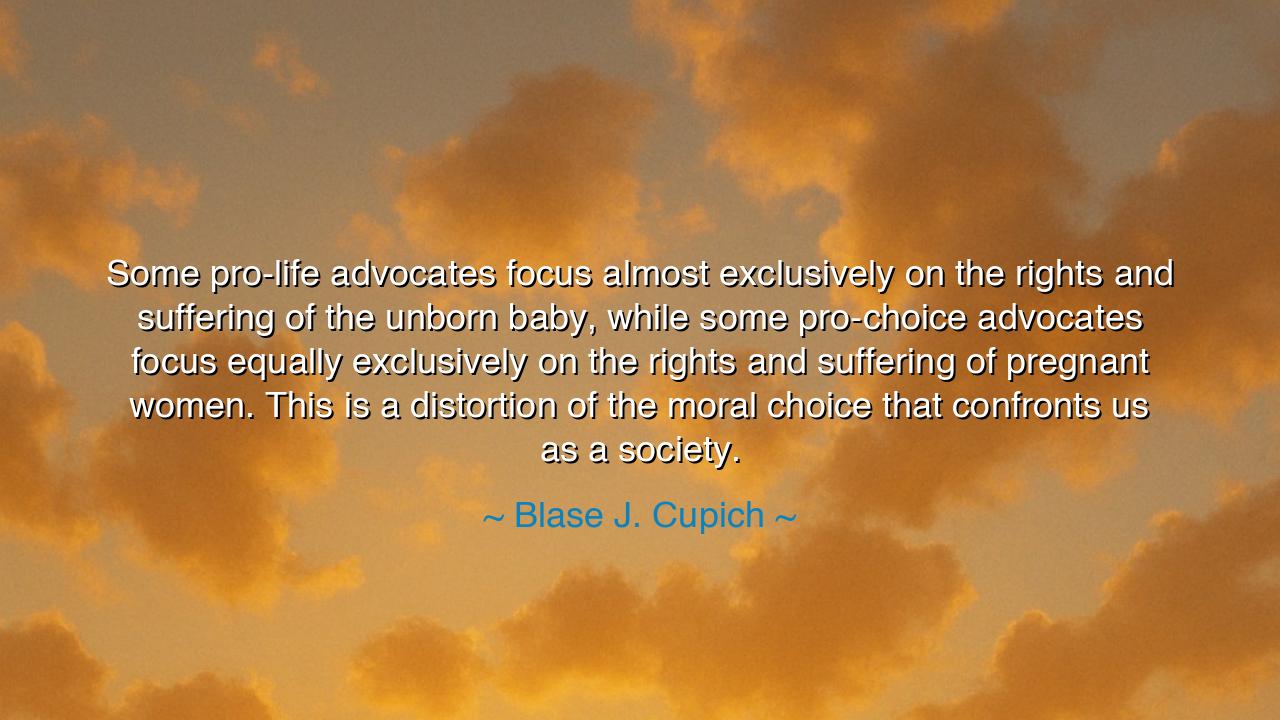
Some pro-life advocates focus almost exclusively on the rights
Some pro-life advocates focus almost exclusively on the rights and suffering of the unborn baby, while some pro-choice advocates focus equally exclusively on the rights and suffering of pregnant women. This is a distortion of the moral choice that confronts us as a society.






"Some pro-life advocates focus almost exclusively on the rights and suffering of the unborn baby, while some pro-choice advocates focus equally exclusively on the rights and suffering of pregnant women. This is a distortion of the moral choice that confronts us as a society." These words by Blase J. Cupich call us to confront the deep complexity of the moral decisions that surround the issue of abortion, urging us to see beyond the narrow, polarized views that often cloud our understanding. It is too easy to fall into camps, to simplify a profound and heart-wrenching dilemma into a battle between two competing rights. But true wisdom lies in understanding that the moral choice before us does not rest solely on the suffering of one group, whether that be the unborn child or the pregnant woman, but rather on a broader, more nuanced understanding of the human experience and our shared moral responsibility.
The ancient philosophers spoke often of balance, of moderation, and of the importance of seeing the whole of a situation, rather than reducing it to opposing extremes. Aristotle, in his teachings on the Golden Mean, argued that virtue lies in finding the balance between excess and deficiency. Too much focus on one aspect—whether the unborn child or the pregnant woman—distorts the truth of the situation, just as focusing on one extreme of virtue or vice without the other can lead to moral blindness. The wisdom of the ancients reminds us that it is the duty of a society to hold both the life of the unborn and the well-being of the mother in tension, seeking to honor both in equal measure, without allowing one to overshadow the other.
Throughout history, societies have grappled with the difficult balance of life and freedom, and this question of life is not new. The Romans, for example, held complex views about the status of the unborn, yet also believed that the rights of a mother—her health, her freedom, and her ability to care for herself—were paramount. The moral decisions made in their time were not simple, nor were they rigid. They required wisdom, deliberation, and a recognition of the complexity of the human condition. We can draw from this ancient wisdom in our own day, where the polarization of the abortion debate has often led us to forget the moral weight of the issue.
In more recent history, Abraham Lincoln faced a similar dilemma when he navigated the moral question of slavery. The rights of individuals—the freedom of enslaved people—were set against the entrenched system that benefitted slave owners. Lincoln, while standing firmly on the side of human dignity and freedom, recognized that the moral choices before him required the careful consideration of both human suffering and the broader social structure. His leadership was not defined by a simple, binary choice but by the sacrifice and deliberation that came with confronting such a profound moral crisis. In the same way, the abortion debate requires a steady hand and a heart willing to hold both sides of the issue in thoughtful tension.
Cupich’s words ask us to resist the temptation of an easy answer. To focus solely on the unborn or only on the mother is to miss the moral complexity of the situation. In the case of the unborn, we must recognize the sanctity of life, and the moral duty to protect it. Yet, in the case of the mother, we must also honor her autonomy, her health, and the choices that belong to her body. To make a decision that honors one without considering the other is to distort the very essence of justice and compassion. The moral choice is not simply a matter of right versus wrong, but a recognition of the intertwined realities of life, suffering, and responsibility.
The lesson of Cupich’s insight is not just about the abortion debate, but about the nature of moral deliberation itself. It calls us to be humble in our judgments, to see beyond our own experiences, and to embrace the complexity of human suffering. We are not called to a simplistic choice, but to the hard, uncomfortable work of seeking balance—of understanding the rights and suffering of all parties involved. This requires empathy, wisdom, and a willingness to engage in dialogue with those whose experiences may differ from our own.
Thus, let us heed the words of Blase J. Cupich and strive to balance the moral weight of the situation. Let us not fall into the trap of extremism or simplification, but embrace the complexity of life’s hardest choices. In our lives, and in the decisions we make, let us always seek to honor the dignity of all human beings, acknowledging both the rights of the unborn and the autonomy of the mother. In this, we will find a path toward greater understanding, justice, and compassion for all.






AAdministratorAdministrator
Welcome, honored guests. Please leave a comment, we will respond soon